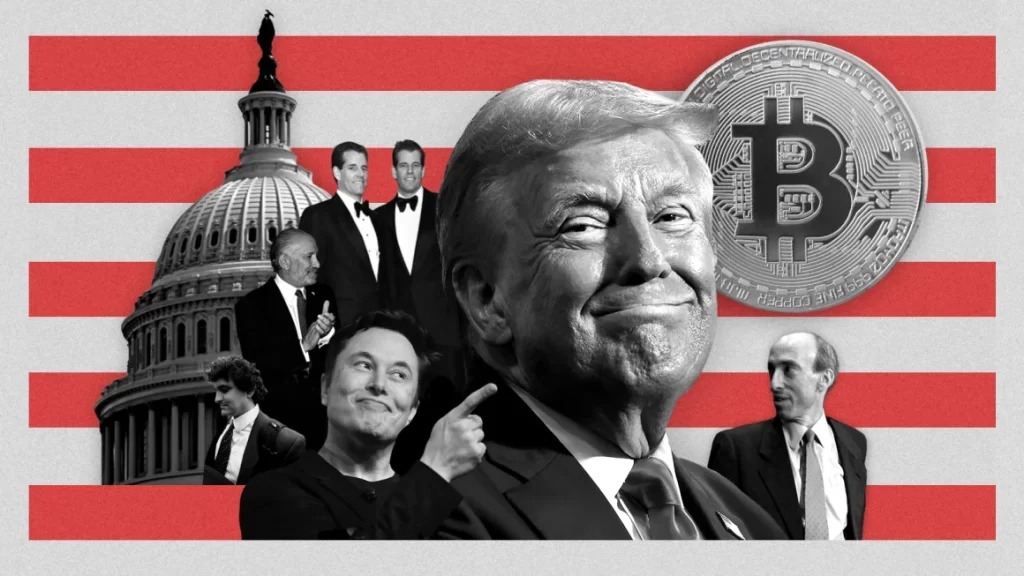The crypto industry plowed tens of millions into the election. Now, it’s looking for a return on that investment
4 min read
Illustration: Ian Berry/CNN/Getty Images

Illustration: Ian Berry/CNN/Getty Images
The cryptocurrency industry has significantly increased its political influence this election cycle, spending $131 million through super PACs to support pro-crypto lawmakers. In addition to these collective efforts, individual crypto billionaires have poured millions into backing former President Donald Trump’s bid for re-election. Now, the industry is pushing hard for a return on its investment, aiming to reshape how Washington regulates crypto and its future role in the U.S. financial system.
A major priority for the crypto industry is ensuring that Trump appoints a crypto-friendly chair for the Securities and Exchange Commission (SEC) to replace Gary Gensler. Gensler’s tenure, marked by aggressive regulatory actions, has drawn the ire of many crypto CEOs. Additionally, industry groups are lobbying Congress to pass a clear regulatory framework to integrate digital assets into the mainstream financial system. According to the pro-crypto group Stand with Crypto, 274 pro-crypto candidates were elected to the House, and 20 to the Senate, during this cycle.
This political momentum marks a dramatic recovery for the crypto industry, which only two years ago was reeling from the collapse of the FTX exchange. The scandal, which involved fraud by FTX founder Sam Bankman-Fried, led many lawmakers to distance themselves from his donations. However, with Bitcoin soaring and Trump’s political fortunes rising, the crypto sector has come back strong.
“Crypto is a political force,” Kristin Smith, CEO of the Blockchain Association, told CNN. Smith added that the election results have created the “most pro-crypto Congress” and the “most pro-crypto administration” in U.S. history. Industry leaders are now actively engaging with Trump’s transition team, discussing key appointments and advocating for policies that would benefit crypto.
Among the potential candidates for SEC chair is Dan Gallagher, a former SEC commissioner who currently serves as the chief legal officer at Robinhood, which offers cryptocurrency trading. Another name floated is Paul Atkins, a former SEC commissioner and financial services consultant. Both men are seen as more crypto-friendly compared to Gensler. Smith has also suggested that the creation of a White House czar to oversee crypto policy could be on the table.
Trump, who once dismissed Bitcoin as a “scam,” has evolved into a crypto proponent. During a Bitcoin conference this past summer, Trump expressed his intention to oust Gensler and promised to make the U.S. “the crypto capital of the planet.” He has also talked about establishing a national cryptocurrency reserve and even launched a crypto venture called World Liberty Financial with his sons, raising questions about potential conflicts of interest in his administration.
Trump’s shift toward crypto has been influenced, in part, by his sons and allies like Steve Witkoff, a close Trump associate and real estate developer. In addition, high-profile crypto figures like Elon Musk have also backed Trump’s political agenda. Musk, who has promoted Dogecoin and been involved in the crypto space, has donated heavily to Trump’s efforts. Along with venture capitalists Marc Andreessen and Ben Horowitz, Musk and others have played a key role in funding super PACs supporting Trump’s candidacy.
The crypto industry’s political spending blitz wasn’t limited to backing Trump. Super PACs affiliated with the industry, including Fairshake, Defend American Jobs, and Protect Progress, also targeted congressional races. Fairshake alone spent $10 million against Rep. Katie Porter, a Democrat who had been a vocal critic of the industry. Porter lost her Senate primary to Adam Schiff, another Democrat.
One notable race where crypto PACs spent heavily was Ohio, where $40 million was invested in backing Bernie Moreno, a Republican Senate candidate. Moreno, a blockchain advocate, defeated incumbent Democratic Sen. Sherrod Brown, who had called for stricter regulation of the crypto sector.
Looking ahead, the industry is pushing for legislation that would shift regulatory authority over crypto from the SEC to the Commodity Futures Trading Commission (CFTC). A proposal to do this passed the House earlier this year but was blocked in the Senate. Despite this setback, industry insiders argue that their increased political spending has demonstrated crypto’s growing political influence.
Crypto advocates argue that the industry is not looking to avoid regulation, but rather to establish clear and consistent rules to foster innovation. “In order to build, you need to know what the rules are governing what you are building,” said Colin McLaren of the Cedar Innovation Foundation, a crypto-aligned nonprofit.
However, consumer protection groups have expressed concerns about the industry’s newfound political clout. Robert Weissman, co-president of the left-leaning group Public Citizen, criticized the crypto sector’s influence, warning that its political spending could lead to weaker protections for consumers.
As the industry continues to flex its political muscle, it is preparing for future battles. Fairshake has already raised $78 million for the 2026 midterm elections, signaling that crypto’s political engagement is set to be an enduring force in Washington. According to Kara Calvert of Coinbase, the industry is committed to continued investment in its political agenda, ensuring that Congress remains responsive to its priorities.